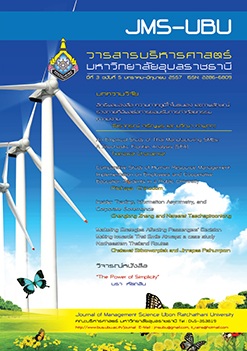An Empirical Study of Thai Manufacturing SMEs: A Stochastic Frontier Analysis (SFA)
Main Article Content
บทคัดย่อ
This paper applies a stochastic frontier production function and technical inefficiency effects model to measure, compare and explain the technical efficiency of Thai manufacturing small and medium-sized enterprises (SMEs) in the pre and post 1997 Asian financial crisis periods. Crosssectional firm-level data from industrial censuses conducted in 1997 and 2007 are utilized. Average technical efficiency levels in all categories of manufacturing SMEs analyzed in the pre and post crisis periods are found to be low, indicating a high degree of technical inefficiency in the production process. Only medium sized SMEs are found to have improved their technical efficiency and export intensive SMEs have maintained their technical efficiency in the post crisis period, despite reform measures aimed at improving firm performance. Manufacturing SMEs have remained predominantly labor intensive in both periods with no apparent improvement in firm productivity and innovation. The technical inefficiency effects model reveals that small sized enterprises are found be more technically efficient than medium sized enterprises. Firm age, skilled labor, location, ownership type, foreign investment and exporting are key factors contributing to firm technical efficiency in both the pre and post crisis periods. The paper concludes that government policy in the post crisis period have been largely ineffective and should place more attention on creating an enabling environment to foster SME growth, enhance technology and innovation capability, and encourage the development of an environment, infrastructure and facilities conducive to enhancing the business operation of SMEs to enhance their technical efficiency.
Downloads
Download data is not yet available.
Article Details
รูปแบบการอ้างอิง
Charoenrat, T. (2014). An Empirical Study of Thai Manufacturing SMEs: A Stochastic Frontier Analysis (SFA). วารสารบริหารศาสตร์ มหาวิทยาลัยอุบลราชธานี, 3(5), 18–52. สืบค้น จาก https://so03.tci-thaijo.org/index.php/jms_ubu/article/view/85962
ประเภทบทความ
Articles
บทความที่ตีพิมพ์ในวารสารบริหารศาสตร์ มหาวิทยาลัยอุบลราชธานี เป็นลิขสิทธิ์ของวารสาร โดยเนื้อหาและความคิดเห็นในบทความเป็นความรับผิดชอบของผู้เขียนแต่ละท่าน ไม่เกี่ยวข้องกับคณะบริหารศาสตร์ มหาวิทยาลัยอุบลราชธานีแต่อย่างใด และหากมีข้อผิดพลาดประการใด ผู้เขียนจะเป็นผู้รับผิดชอบต่อบทความของตนเองแต่เพียงผู้เดียว

